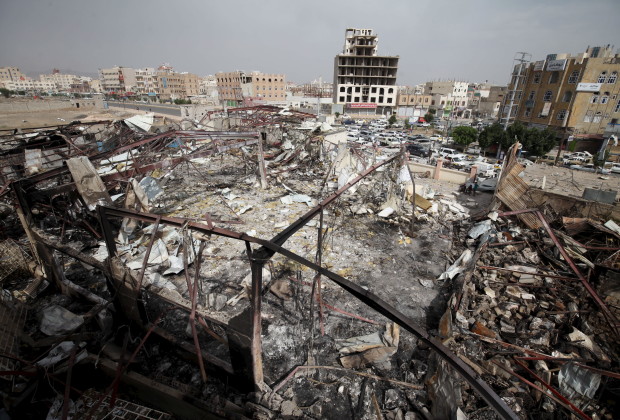Watchdogs Warn Against US Saudi Arms Deal

NEW YORK: The United States Department recently approved a resumption of weapon sales to Saudi Arabia -- indicating a potential reinvigoration of US-Saudi ties and Washington’s support for Saudi military intervention in the Middle East, most notably in Yemen.
Critics have long linked the supply of arms to Saudi Arabia to the bombing of civilians in Yemen, with pressure prompting the Obama administration to suspend the sale of precision guided munitions to Riyadh. Secretary of State Rex Tillerson’s approval of the weapons sales reverse Obama’s decision, and while it needs White House approval to go into effect, the move is a clear indication of Washington’s more Saudi friendly approach and perhaps a more hawkish stance on Iran.
The move draws the US back into the Yemen war, where a largely Arab coalition led by Saudi Arabia has been bombing strongholds of the Houthi rebels, who Riyadh says are backed by Iran. News of mounting civilian deaths, however, forced Obama to scale back support, although the US has provided support to the Saudi air campaign in Yemen since 2015, including aerial refueling for Saudi jets and a U.S. advisory mission in the Saudi operations headquarters.
The conflict in Yemen is now in its third year, and while there has been little headway in restoring the Saudi-loyal Yemeni President Abed Rabbo Mansour Hadi, over 10,000 civilians have been killed according to UN estimates. The real figures are likely to be higher.
Obama’s decision to scale back support came in the form of halting the planned sale of roughly $390 million worth of precision munitions guidance systems to Riyadh after news emerged that 100 people were killed after Saudi jets bombed a funeral hall in Yemen. However, Obama remained careful not to alienate the crucial Middle Eastern ally, offering in stead other forms of military support. Nevertheless, US-Saudi ties were impacted by the Iran nuclear deal, with Riyadh taking issue with Washington reaching out to its arch rival in the region, Tehran.
President Trump, since assuming office, has vocally criticised the Iran nuclear deal, and the latest decision to renew arms supports to Saudi Arabia is an indication that US foreign policy is set to alter the balancing act laid out by Obama, turning right back to Riyadh.
In addition to Saudi Arabia, the administration also approved arms sales to Bahrain.
Amnesty International this week urged President Trump not to approve impending arms sales to Saudi Arabia and Bahrain. The deals would arm members of a military coalition that has attacked thousands of civilians in Yemen and violated international humanitarian law. Amnesty International researchers have already found both unexploded U.S. bombs and identifiable fragments of exploded U.S. bombs among the ruins of Yemeni homes and other civilian objects.
Yemen is one of the six Muslim-majority countries included in Trump’s revised travel ban executive order, which comes into effect this week.
“If approved, this deal would essentially have President Trump throwing gasoline on a house fire and locking the door on his way out,” said Margaret Huang, Amnesty International USA executive director.
“The U.S. should not continue to arm governments that violate international human rights and humanitarian law and simultaneously shut its doors to those fleeing the violence it helps to escalate. Arming the Saudi Arabia and Bahrain governments risks complicity with war crimes, and doing so while simultaneously banning travel to the U.S. from Yemen would be even more unconscionable. President Trump must not approve this arms deal.”
Meanwhile, a recent UN analysis notes that an estimated 17 million people in Yemen are hungry, with the war creating a massive humanitarian crisis. “Twenty of the country's 22 governorates are in 'emergency' or 'crisis' food insecurity phases and almost two-thirds of the population are now facing hunger and urgently require life and livelihood-saving assistance,” the UN Food and Agricultural Organization (FAO) said in a press release.
These numbers represent an increase of 21 per cent since June 2016, according to information from the latest Integrated Food Security Phase Classification (IPC) analysis, a partnership of FAO, UN World Food Programme (WFP) and a number of governmental and non-governmental organizations.
Given the number of people who are food insecure, “Yemen is currently one of the worst hunger crises in the world,” FAO said.
The crisis is fuelled by the two-year long conflict, with almost 80 per cent of households in Yemen report having a worse economic situation than before the fighting.



